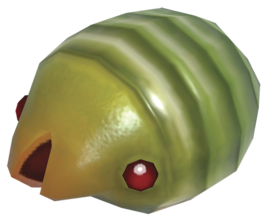Swarming Sheargrub: Difference between revisions
(→Naming) |
m (Enemy navboxes are now separated by game.) |
||
| Line 101: | Line 101: | ||
*[[Breadbug]] | *[[Breadbug]] | ||
{{ | {{p3enemies}} | ||
[[Category:Harmless enemies]] | [[Category:Harmless enemies]] | ||
[[Category:Wandering enemies]] | [[Category:Wandering enemies]] | ||
[[Category:Tropical Wilds]] | [[Category:Tropical Wilds]] | ||
Revision as of 16:27, April 2, 2022
| |||
|---|---|---|---|

| |||
| Appears in | Pikmin 3 | ||
| Scientific name | Himeagea turba | ||
| Family | Mandiblard | ||
| Areas | Tropical Wilds | ||
| Mission Mode Collect Treasure! stages | Beastly Caverns | ||
| Mission Mode Battle Enemies! stages | Tropical Wilds Remix | ||
| Side Story days | None | ||
| Bingo Battle stages | Jigsaw Fortress | ||
| Attacks | Weighs down objects | ||
The Swarming Sheargrub (ブリコ?) is a green Sheargrub with red eyes found in Pikmin 3. It, in every way excluding size and color, resembles a Female Sheargrub. Swarming Sheargrubs are known to follow Pikmin from a distance and can distract an entire squad as a result.
They move around in swarms at high speed (fastest of any known mandiblard). They have no form of offense but can move quickly, taking any attacking Pikmin with them. Once they come across any nectar, they will consume it and grow in size. They can also hide under plants, like Pikmin. Most swarms come in groups of seven.
When they spot a salvageable object – such as a fruit, pellet, Victory Macaroon, or carcass – they will jump and sit on top of it, weighing it down and thus, making it require more Pikmin to carry. The larger they are, the more they will weigh.
While they are an annoying hindrance to the player, they are easily defeated like any other type of mandiblard. However, once a single member of a swarm is harmed, the rest will disperse and run away at very high speeds. It's advised to call all Pikmin back at this point, as they will attempt to chase the fleeing Sheargrubs, only to end up getting themselves lost.
Swarming Sheargrubs will always spawn above the ground where the Lesser Mock Bottom is located.
Stats
| Weight | Max. carriers |
Seeds | Value | Health |
|---|---|---|---|---|
| 1 | 1 | 1 | 45 |
Strategy
The best strategy is to throw some non Winged Pikmin and you should get at least 3 of them. Wait for them to come back and get them again. In Tropical Wilds Remix, let the Baldy Long legs kill some for you.
Notes
Alph's comments
“Structural flaw: back
Weight: 1
Brittany's comments
Charlie's comments
Louie's comments
Olimar's comments
“Swarming Sheargrub
Himeagea turba
Mandiblard family
Pikmin 3 Prima Guide
Technical information
| Pikmin 3 technical information (?) | |
|---|---|
| Internal name | ujinko_a (c)
|
| HP | 45 |
| Rock Pikmin throw hits to kill | 1 |
| White Pikmin ingestions to kill | 0 |
| Bomb rock explosions to kill | 1 |
| Bomb rock ingestions to kill | 0 |
| Number of direct hits on top to kill | 1 |
| Damage to leaders | 0 |
| Territory radius | 200 |
| Mission Mode value | 5 |
Naming
- See also: Mandiblard family#Naming.
- Common name: Swarming Sheargrub. They are distinguished from other sheargrubs with the word "Swarming", because they move in a swarm.
- Japanese nickname: ブリコ?. It is the name given to the roe of the Japanese sandfish, since fish roe is typically a large group of eggs, not entirely unlike the Swarming Sheargrubs. Similarly to other mandiblards, the name ends in コ? (lit.: "small").
- Japanese name: ムレヒメアギト?, lit.: "Swarm Small Jaw".
- Scientific name: Himeagea turba. Turba is latin for "crowd".
- Internal names: Internally, it shares its data with the Female Sheargrub, so its internal name is
ujinko_a, but when it needs to be disambiguated from the Female Sheargrub, it uses the nameujinko_c. - Prerelease: None.
Names in other languages
| Language | Name | Meaning |
|---|---|---|
| ブリコ? Buriko |
||
(traditional) |
團團蛆仔 | |
| Boufpon grouillant | Portmanteau of bouffe (eat, grub) and pont (bridge); Swarming bridge-eater | |
| Schwarm-Termitentos | Swarm Sheargrub | |
| 떼벼룩 | ||
| Comején fructófilo | Fructophilic termite | |
| Comején fructófilo | Fructophilic termite |
Gallery
Swarming Sheargrubs weighing down a Scaly Custard.
Pikmin carrying a Velvety Dreamdrop infested with Swarming Sheargrubs.
A group of Swarming Sheargrubs in Tropical Wilds.
Swarming Sheargrubs drinking nectar, notice the size difference between them.
A swarm weighing down a Velvety Dreamdrop, as shown by the carrying numbers.
Trivia
- These are the only known enemies that can increase in size by consuming an item.
- When a Swarming Sheargrub gets on top of an object or drinks nectar, a munching sound can be heard.
- In the April 17th, 2013 Nintendo Direct footage that revealed Winged Pikmin, Swarming Sheargrub sound effects can be heard in the Twilight River, suggesting that they were originally going to appear in that area.
- Oddly, their corpses are very light, and can be pushed very easily by having a leader walk into them. This is not true for other mandiblards.





